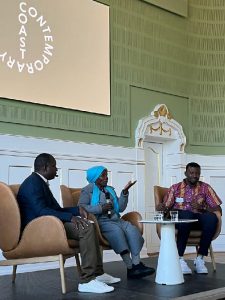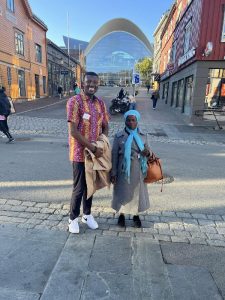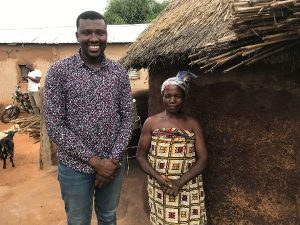A woman known as Suuk Laari was branded as a sorcerer and had to live in the infamous Gambaga Witch Camp in the Northern Region of Ghana for 15 years has made a first-time trip to Norway.
Suuk Laari was in Tromso, Norway, to attend the Coast Contemporary 2022 Conference as an important invitee.
The conference aims to help raise awareness of modern-day witch-hunts.
Laari’s story was made public in a Facebook post shared by a user, Larry Ibrahim Fataka Imf, a PhD Research Fellow at UiT, The Arctic University of Norway.
The theme for the conference was influenced by the master thesis of Larry Ibrahim Mohammed, who wrote on the Gambaga Witch Camp.
Suuk Laari had lived in the Gambaga witch camp for 15 years until this month. Last week, she was assisted in joining the Coast Contemporary 2022 Conference in Tromso, Norway. This was to help raise awareness of the modern-day witch-hunt.
“I am extremely proud yet humbled to have worked with Tanja Eli Sæter, Founder and Executive Director of Coast Contemporary, to make Suuks participation a possibility and for co-curating the Ghana part of the Program with me”, Larry stated.
According to additional information shared by Larry Ibrahim, he described Suuk as a witch-hunt survivor.
The alleged witch had lived in the Gambaga Witchcamp for 15 years. Like everyone from the Camp, her story unites with other women there who run away for their dear lives after being accused of witchcraft.
“The month of September 2022 will stand out as one of the best in her life. Suuk and Samson Laar, coordinators of the Gambaga witch camp and the Presbytery, go home project, were invited to attend the Coast Contemporary conference 2022 in Tromso, Norway. Suuk was among the Guest of Honor,” he wrote.
He also spoke about the address Suuk Laari delivered at the conference, which focused on her personal story.
“Suuk Laari delivered a keynote, recounting the detail of her story on how she ended up at the Gambaga Witch Camp and her experiences while living there. She asked for a global effort to fight and illegalised the accusation of witchcraft and for more education on eliminating bad cultural practices. When asked about her thoughts on closing the witch camps, she emphasized that it is akin to scratching the surface of the problem. According to her, without the witch camp, she would probably have been dead and forgotten.”
On the other hand, she called for more support to help feed the women in the Gambaga Witch Camp.
As a coordinator of the Go Home Project, the main task has been reuniting the women with their families and resolving any conflict that might have led to them relocating to Gambaga.
Larry’s thesis also won the Ase Hiorth Lervik prize for best master thesis with a gender theoretical perspective in 2021 with a ceremony in Tromso, Norway.
About The Witch Camp
Gambaga Witch camp is a segregated community within Gambaga township in the Northern Region of Ghana established in the 18th century to accommodate alleged witches and wizards who are banished from their communities.
The camp has about 25 round huts and holds about 100 women. No health services or indoor plumbing are available.
Many women in Ghana’s witch camps are widows and it is thought that relatives accused them of witchcraft to take control of their husbands’ possessions. Other old women in the camp have been accused of using black magic to cause misfortunes in their community. Many women also are mentally ill, a little understood problem in Ghana. In Gambaga, the women are given protection by the local chieftain and in return, pay him and work in his fields



Source: Ghanaweb


